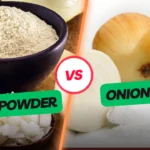Baking soda, also known as sodium bicarbonate, is a versatile household ingredient that has been used for various purposes for centuries. From cleaning and deodorizing to cooking and baking, baking soda has found its way into many aspects of our daily lives. However, there is some confusion and debate among individuals regarding its edibility. This blog post will explore the question, “Is baking soda edible.”
What Is Baking Soda?
Baking soda, sodium bicarbonate (NaHCO3), is a white crystalline powder used in cooking, cleaning, and personal care. It is a chemical compound that acts as a leavening agent, meaning it helps dough rise by releasing carbon dioxide when it reacts with an acid. Baking is commonly used to make cakes, cookies, and breads fluffy and light. Baking soda also has alkaline properties, making it effective for neutralizing odours and acting as a gentle abrasive for cleaning. Additionally, it can be used as a natural deodorant, toothpaste ingredient, and skin exfoliator due to its mild antiseptic properties.
Can You Eat Baking Soda?
Yes, baking soda is safe to eat in small amounts and is commonly used as a leavening agent in baking. However, it is important to note that consuming large quantities of baking soda can be harmful and cause adverse effects such as stomach upset, electrolyte imbalances, and metabolic alkalosis. It is recommended to use baking soda in moderation and consult a healthcare professional before consuming it for medicinal purposes.
What Happens If Baking Soda Is Ingested?
If baking soda is ingested, it can cause a range of adverse effects on the body. Baking soda, also known as sodium bicarbonate, is a chemical compound commonly used in cooking and baking as a leavening agent. However, when consumed in large amounts or concentrated form, it can lead to various health issues. Ingesting baking soda can disrupt the acid-base balance in the body, leading to metabolic alkalosis. Symptoms may include nausea, vomiting, abdominal pain, diarrhoea, muscle twitching, and increased thirst. Severe cases can result in electrolyte imbalances, kidney damage, and cardiac arrest. It is important to note that ingesting baking soda should be avoided unless under the guidance of a healthcare professional.
Is Pure Baking Soda Toxic?
Pure baking soda, also known as sodium bicarbonate, is generally considered safe for consumption and use in various household applications. It is non-toxic and has a long history of being used in cooking, cleaning, personal care, and medical remedies. However, it is important to note that excessive baking soda consumption or misuse can lead to potential health risks. Ingesting large amounts can disrupt the body’s acid-base balance and cause electrolyte imbalances. Additionally, prolonged or excessive use on the skin can cause irritation or dryness. It is always recommended to use baking soda in moderation and consult a healthcare professional for specific concerns or conditions.
Is It Safe To Eat Baking Powder Raw?
No, it is not safe to eat baking powder raw. Baking powder is a leavening agent that contains sodium bicarbonate (baking soda) and an acid, usually cream of tartar. Baking powder releases carbon dioxide gas when mixed with liquid and heat, causing dough or batter to rise. Consuming raw baking powder can lead to serious health risks. The high sodium levels in baking powder can disrupt the electrolyte balance in the body, leading to dehydration and increased blood pressure. Additionally, ingesting large amounts of baking powder can cause stomach upset, nausea, and vomiting. It is important to use baking powder as directed in recipes and avoid consuming it raw.
What Happens When You Eat A Spoonful Of Baking Soda?
When you eat a spoonful of baking soda, it can have various effects on your body. Baking soda, also known as sodium bicarbonate, is a basic compound that can neutralize acids in the stomach. Consuming it can help alleviate symptoms of indigestion, heartburn, and acid reflux. However, ingesting too much baking soda can lead to adverse effects such as electrolyte imbalances, metabolic alkalosis, and organ damage. It is important to use baking soda in moderation and consult a healthcare professional before using it as a remedy.
Is A Teaspoon Of Baking Soda A Day Good For You?
No, consuming a teaspoon of baking soda daily is not good for you. While baking soda can have some health benefits when used in moderation and under specific circumstances, such as relieving occasional heartburn or indigestion, it is not recommended to consume it daily. Baking soda is high in sodium and can disrupt the body’s electrolyte balance, leading to potential health issues like high blood pressure, oedema, and kidney problems. Additionally, excessive consumption of baking soda can interfere with the body’s natural digestive processes and may cause gastrointestinal discomfort. It is always best to consult a healthcare professional before incorporating any new substance into your daily routine.
How Much Baking Soda Is Safe Per Day?
The safe daily intake of baking soda varies depending on an individual’s age, health condition, and specific needs. However, it is generally recommended to limit the consumption of baking soda to no more than 3.5 grams per day for adults. Consuming excessive baking soda can lead to potential side effects such as electrolyte imbalances, metabolic alkalosis, and gastrointestinal issues. It is crucial to consult with a healthcare professional before incorporating baking soda into your daily routine or using it as a remedy for any health condition.
Should I Brush My Teeth With Baking Soda?
Yes, brushing your teeth with baking soda can benefit oral health. Baking soda, also known as sodium bicarbonate, has mild abrasive properties that can help remove surface stains and plaque from the teeth. It can also neutralize acids in the mouth, reducing the risk of tooth decay and gum disease. However, it is important to note that baking soda should be used in moderation, not as a replacement for regular toothpaste. Using excessive baking soda can erode the enamel on your teeth and cause sensitivity. It is recommended to consult with a dentist before incorporating baking soda into your oral hygiene routine.
How Much Baking Soda Can I Use To Brush My Teeth?
You should not use baking soda to replace toothpaste when brushing your teeth. While baking soda can be used occasionally as a supplementary ingredient in toothpaste, using it alone and in excessive amounts may adversely affect oral health. Baking soda is abrasive and can damage the enamel of your teeth if used in large quantities or too frequently. It is recommended to consult with a dentist before incorporating baking soda into your oral hygiene routine.
Can Baking Soda Help You Lose Weight?
No, baking soda cannot help you lose weight. While baking soda has been used for various purposes, such as a leavening agent in baking or as an antacid for indigestion, there is no scientific evidence to support the claim that it aids in weight loss. Weight loss is a complex process that involves a combination of factors, including a balanced diet, regular physical activity, and overall lifestyle choices. It is important to rely on proven methods for weight loss rather than unverified claims.
Conclusion
In conclusion, baking soda is edible and safe for consumption when used appropriately. It is commonly used as a leavening agent in baking and cooking and a natural remedy for various digestive issues. However, it is important to note that excessive consumption of baking soda can lead to potential health risks, such as electrolyte imbalances and metabolic alkalosis. Therefore, it is crucial to use baking soda in moderation and consult a healthcare professional before using it for medicinal purposes.
FAQs
What Baking Soda Definitely Can’t Do For Your Health?
Baking soda definitely cannot cure serious health conditions or replace medical treatments. It is not a substitute for professional medical advice.
Is It Bad To Brush Your Teeth With Baking Soda?
Brushing your teeth with baking soda can be harmful as it is abrasive and can damage the enamel of your teeth. It is recommended to use toothpaste specifically formulated for dental care.
Are Baking Powder And Baking Soda The Same Thing?
No, baking powder and baking soda are not the same thing. Baking powder combines baking soda, cream of tartar, and a dry acid, while baking soda is pure sodium bicarbonate.
Is Baking Soda Good For Your Gums?
Yes, baking soda can benefit your gums as it has antibacterial properties that can help reduce plaque and prevent gum disease. However, it should be used in moderation and with regular oral hygiene practices.
How Much Baking Soda Should I Drink To Reduce Inflammation?
It is recommended to consult a healthcare professional before consuming baking soda as a remedy for inflammation. A medical expert should determine the appropriate dosage and usage of baking soda for reducing inflammation.
What Can You Do With Arm & Hammer Baking Soda?
Arm & Hammer Baking Soda can be used for various purposes, such as cleaning, deodorizing, and cooking. It is a versatile product that can be used in numerous ways to tackle everyday tasks.
What Happens If I Use Baking Soda Instead Of Baking Powder?
If you use baking soda instead of baking powder, your baked goods may not rise properly and taste bitter.






